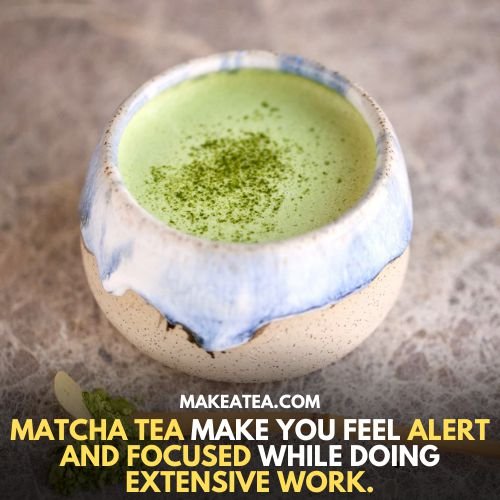Hey tea lover! You know, matcha tea is extremely popular. That’s why everyone is talking about it and asking different questions about it. Just like, can I drink matcha tea at night and before bed? Can I have too much matcha? Is there lead in matcha? and many more.
So, we have compiled a list of frequently asked questions about matcha tea with suitable answers.
Let’s get the answers to the most frequently asked questions about matcha tea.
Can I Drink Matcha Tea Every Day?
Yes! You can drink 4 to 5 cups of matcha tea every day. But always keep in mind that it contains caffeine. So, excessive intake of caffeine can be harmful to your health.
But 3 cups per day would be safe to consume. It will make you feel relaxed and focused all day long.
When Should I Drink Matcha Tea?
There is not any specific time to drink matcha tea. You can drink matcha tea at any time to get health benefits. A cup of matcha tea in the morning can give your metabolism a boost. Also, if you drink matcha tea right before work out or any other physical activity then it will reduce fatigue.

Can I Drink Matcha Tea at Night and Before Bed?
Obviously yes! It gives you a boost to think deeply. If you want to do work late night, also want to be alert and focused all the time then matcha tea will do it for you. Also, it keeps your mind calm and fresh. Matcha tea contains an amino acid, which boosts alpha brain waves and quietens beta waves.
Another thing to remember, it may interrupt your sleep. It will make you energetic and more productive at night as it makes you feel relax in the morning.
Can I Have Matcha on an Empty Stomach?
Yes, why not! It’s the best time to enjoy a cup of matcha tea to get the benefits of its nutrients. Also, on an empty stomach, your body absorbs more antioxidants that are beneficial for your health.
But there is a chance of a few people getting their stomach upset. If they are drinking on an empty stomach and not used to it.
How Long Does It Take for Matcha to Kick in?
You can notice the effects of matcha tea for 2 to 6 hours after consuming it. However, some people start feeling the benefits of matcha within few minutes.
Can I Have Too Much Matcha?
Actually no, as we know matcha has caffeine components in it. So, too much caffeine can be brutal for your health. It’s necessary to limit yourself to 4 – 5 cups in a day.
Is There Lead in Matcha Tea?
It varies, because if you get matcha tea produced in Japan, then it doesn’t contain lead. But if you’re getting matcha tea from China, then it will contain lead.
Make sure to get matcha that is harvested in Japan. Because Japan produces the best quality of matcha tea. The best quality doesn’t contain any lead.
Always check for high-quality and organic leaves that do not contain lead. But remember matcha that is harvested in China may contain lead. Because the soil of China contains lead.

What Does Matcha Taste Like?
Matcha tea has a slightly bitter, grassy, and smooth taste. Many people say it’s like vegetal taste mixed with umami.
In premium-grade, you don’t need to add sweetener. But if you are drinking lower grade then you need to add sweetener for a better taste.
Is Matcha Tea Safe?
Yes, matcha tea is safe. Although matcha tea contains caffeine. But moderate intake of matcha tea is safe and beneficial for your mental and physical health. But always keep in mind that excessive consumption of matcha may harm your health.

Always maintain balance in your diet to get more benefits.
Should You Keep Matcha Tea in The Refrigerator?
The best option is to keep it in the freezer, not in the fridge. Always remember that any cold, dark space can preserve it. If you keep it in open air or heat then it will quickly degrade its color and taste.
Make sure you are using an airtight container to keep it in the freezer.
[table id=38 /]
What are the Health Benefits of Matcha Tea?
Matcha tea has numerous health benefits such as fully packed with antioxidants, catechins, amino acids, and L-theanine. It helps enhance your focus and alertness. Matcha tea also prevent cancer, heart attack, stroke, lung diseases, and liver diseases.
Why Does My Matcha Taste Bitter?
Low-quality matcha will taste bitter. Also, when you use boiling water to prepare matcha tea then it will taste bitter.
Premium quality matcha will not taste bitter. It gives you a strong flavor of green tea, don’t confuse it with bitterness.
Why Doesn’t My Matcha Froth Well?
The reason could be not whisking the matcha tea properly. Also, an insufficient amount of matcha powder for the amount of water could be the reason behind it.
It’s a bit tricky to create beautiful froth, but don’t get disappointed at the beginning. You can make perfect froth with some practice.
What is the Benefit of L-theanine in Matcha?
Matcha tea is full of L-theanine. It makes you feel relax and reduces mental stress levels. Also, it promotes the alpha waves of your brain, which help in determining your mood.
L-theanine combines with caffeine and enhances your alertness and focus.
Will the Water Temperature Affect My Matcha Taste?
Yes! it can affect the taste of matcha tea. if you are using too hot water to prepare matcha tea, it will change the flavor and aftertaste of matcha. The recommended temperature is 160 – 170o F in winter.
Conclusion:-
So, I hope you got the answers to your questions about matcha tea. Matcha tea contains catechins, amino acids, and antioxidants, which are beneficial for your health.
Also, it boosts your energy and performance of your mind. Do let us know if you have more questions about matcha tea. We’ll be more than happy to answer your questions.



